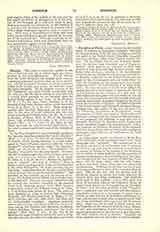

Disciple.—This term is commonly applied to one who is learning any art or science from one distinguished by his accomplishments. Though derived from the Latin discipulus, the English name conveys a meaning somewhat narrower than its Latin equivalent: disciple is opposed to master, as scholar to teacher, whilst both disciple and scholar are included under the Latin discipulus. In the English versions of the Old Testament the word disciple occurs only once (Is., viii, 16); but the idea it conveys is to be met with in several other passages, as, for instance, when the Sacred Writer speaks of the “sons” of the Prophets (IV K., ii, 7); the same seems, likewise, to be the meaning of the terms children, and son in the Sapiential books (e.g. Prov., iv, 1, 10; etc.). Much more frequently does the New Testament use the word disciple in the sense of pupil, adherent, one who continues in the Master’s word (John, viii, 31). So we read of disciples of Moses (John, ix, 28), of the Pharisees (Matt., xxii, 16; Mark, ii, 18; Luke, v, 33), of John the Baptist (Matt., ix, 14; Luke, vii, 18; John, iii, 25). These, however, are only incidental applications, for the word is almost exclusively used of the Disciples of Jesus.
In the Four Gospels it is most especially applied to the Apostles, sometimes styled the “twelve disciples” (Matt., x, 1; xi, 1; xx, 17; xxvi, 20; the sixteenth verse of chapter xxviii, having reference to events subsequent to Christ’s Passion, mentions only the “eleven disciples”), sometimes merely called “the disciples” (Matt., xiv, 19; xv, 33, 36; etc.). The expression “his disciples” frequently has the same import. Occasionally the Evangelists give the word a broader sense and make it a synonym for believer (Matt., x, 42; xxvii, 57; John, iv, 1; ix, 27, 28; etc.). Besides the signification of “Apostle” and that of “believer” there is finally a third one, found in St. Luke, and perhaps also in the other Evangelists. St. Luke narrates (vi, 13) that Jesus “called unto him his disciples, and he chose twelve of them (whom also he named apostles)”. The disciples, in this context, are not the crowds of believers who flocked around Christ, but a smaller body of His followers. They are commonly identified with the seventy-two (seventy, according to the received Greek text, although several Greek MSS. mention seventy-two, as does the Vulgate) referred to (Luke, x, 1) as having been chosen by Jesus. The names of these disciples are given in several lists (Chronicon Paschale, and Pseudo-Dorotheus in Migne, P.G., XCII, 521-524; 543-545; 1061-1065); but these lists are unfortunately worthless. Eusebius positively asserts that no such roll existed in his time, and mentions among the disciples only Barnabas, Sosthenes, Cephas, Matthias, Thaddeus, and James “the Lord’s brother” (Hist. Eccl., I, xii). In the Acts of the Apostles the name disciple is exclusively used to designate the converts, the believers, both men and women (vi, 1, 2, 7; ix, 1, 10, 19; etc.; in reference to the latter connotation see in particular ix, 36), even such as were only imperfectly instructed, like those found by St. Paul at Ephesus (Acts, xix, 1-5).
CHARLES L. SOUVAY.

